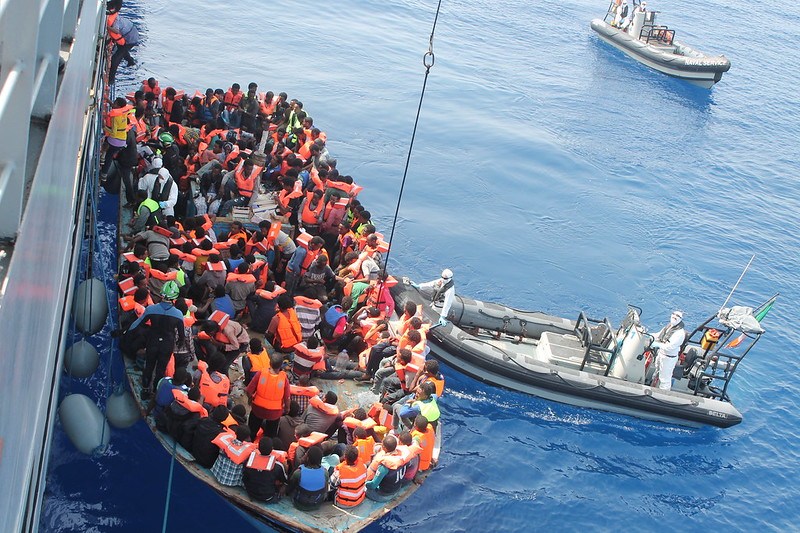Only a few weeks before the new European Commission officially takes office, incoming President Ursula von der Leyen has caused a heated debate by labelling the Commissioner for migration policy as Vice President for “Protecting our European Way of Life”.
As immigration remains a highly politicised topic within Europe, one wonders why von der Leyen added fuel to the fire by framing immigration as a threat to European security and values.
She tried to appease her critics by pointing towards the values enshrined in Article 2 of the EC Treaty, the respect for human dignity, freedom, equality and human rights. However, current policies of EU and member states in the Mediterranean, such as the termination of search and rescue activities (SAR) and the increasing criminalization of private humanitarian rescue missions, cast great doubt on the validity of this statement.
The down-scaling of “Operation Sophia”
Despite the fact that people are still dying during their attempt to cross the Mediterranean, the EU’s mission EUNAVFOR MED, better known as “Operation Sophia”, lost its mandate for naval support.
Italy is expected to uphold its veto for as long as it continues to be the main point of disembarkation while the EU struggles to find a way to distribute responsibilities for asylum among member states. The loss of “Operation Sophia” terminates the engagement of EU actors in the SAR of persons who find themselves in distress at sea.
As a military mission primarily aimed at the disruption of smuggler networks in Libya, “Operation Sophia” was not designed with SAR as a main priority. However, the mere presence of ships and the legal obligation to assist people in emergencies at sea added a humanitarian component that resulted in almost 50,000 rescues since 2015.
Criminalizing private-led SAR
The suspension is all the more critical when seen in the context of the increasing criminalization of NGO-led SAR operations currently ongoing in the Mediterranean. NGOs are not only often denied entry to ports in countries such as Italy or Malta but also face serious legal proceedings on the grounds of “aiding irregular migration” or “smuggling migrants”.
While those policies are knowingly aimed at serving as a deterrent for migration, all they do, really, is exacerbate the risks for the lives of people who attempt to cross the Mediterranean as large parts of the sea remain unmonitored.
While it is often proudly pointed out that the absolute number of deaths at sea has decreased in the last three years, the mortality rate has, in fact, recently increased and previously peaked during the period where NGOs needed to almost entirely suspend SAR due to stricter policies – making the crossing a much riskier endeavour. The EU’s lack of firm rejection of these actions is regrettable and needs to be seriously questioned from a humanitarian and human rights perspective.
Especially, when taking into account that the discontinuation of the EU’s naval mission de facto outsources the responsibility to conduct SAR and prevent outflows to a third country as unstable as Libya as well as local militias.
The pull-factor assumption
Why, then, do European leaders still refrain from resuming action?
One argument is that such operations encourage irregular migration. SAR has been described as creating a “bridge to Europe” and was criticized by the EU’s border agency Frontex for strengthening smuggler networks, thereby endangering the lives of migrants.
These claims, however, are not supported by observations made throughout the last years: In times where the EU or its member states were actively searching, such as during Italy’s operation “Mare Nostrum” in 2013, the mortality rate dropped while the number of arrivals remained almost unchanged. Arrivals were actually found to be highest in periods of low SAR activity which directly contradicts the pull-factor assumption and renders this politicized line of argumentation entirely void.
European hypocrisy?
Since 2014, almost 19,000 deaths have been reported along the Mediterranean routes – a result of EU and member state actions that seek to limit migration regardless of humanitarian consequences.
Can deterrence policies which consciously accept a higher death toll really be in line with European values? The protection of “our European way of life” requires the European community to stay true to the values it expects others to live by. SAR might only be a “band-aid” which temporarily mitigates the consequences of deeper structural problems.
But as recently pointed out by the UN High Commissioner for Refugees, limiting the ability of search and rescue represents an “attack against European culture and tradition”. To avoid being accused of hypocrisy and maintain international credibility, the EU, therefore, needs to act in line with its moral and legal obligations and push for a sustainable way to resume SAR at the world’s “deadliest border”.
Patricia Jaworek


